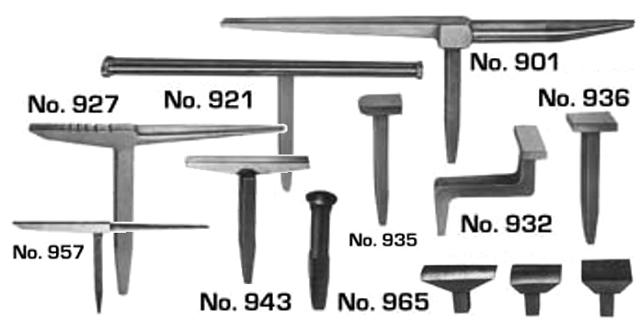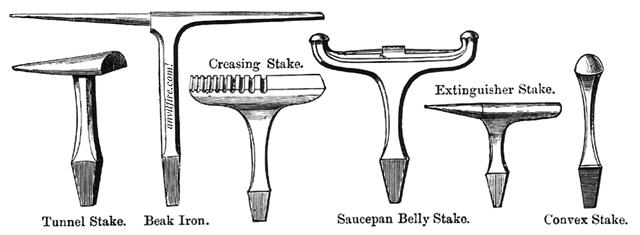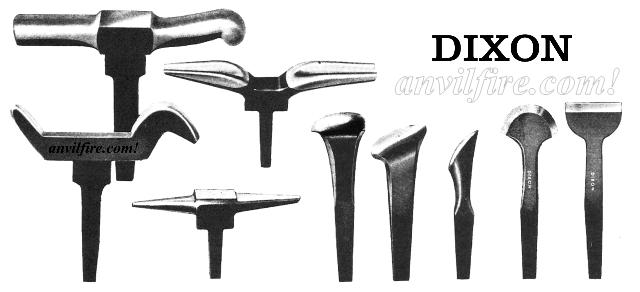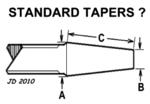|
|
| |
| |
|
|
|
|
|
|
|
|
| |
| |
| |
| |
| |
| |
| |
| |
| |
| |
|




| |
| |
|
Tell them you found it on anvilfire.com!
|
Blacksmithing and metalworking questions answered.
|
Anvils, Stakes,
Amboß,
l'enclume,
incudine,
el yunque, bigornia,
städ,
incus,
aambeeld,
batente
|
|

Selection of Roper Whitney - Pexto Hand Forming Tools
The 900 series tools above as well as other standard stakes are still available as there is still a lot of industrial sheet metal work being done.
 Stake names are either descriptive of their shape, what they were designed to make or the type of worker that used them.
North American names may not be the same as European names.
Many stake types are also made as anvil tools with straight shanks.
Stake names are either descriptive of their shape, what they were designed to make or the type of worker that used them.
North American names may not be the same as European names.
Many stake types are also made as anvil tools with straight shanks.
- T-Stake
- A general term for any letter "T" shaped stake
- Anticlastic Raising Stake
- A round tapered snake shaped form with multiple saddles used in anticlastic raising.
Anticlastic mandels and stakes are made to be hand held, clamped or bench mounted. See Sinusoidal.
- Ball
- A sphere or more than 50% of a sphere on a shank.
Used for any type of curved surface work, forming, dressing, planishing.
- Bath Tub
- A scrolled end on a side offset arm.
Used for making a large rolled edge such as on a bath tub.
- Blowhorn
- Derived from making brass musical instruments - horns that are blown.
A very standardized shape with a large half funnel and a long cylindrical taper.
- Beakhorn
- Similar to a blow horn but of varying proportions with one large conical end and one narrow square or flat topped end.
The large ends are sometimes solid and also made from pressed steel like the large end of a blowhorn stake.
Pexto #901.
Beakhorn stakes are a derivation of stake anvils which had equal length square and conical horns or bicks (from beak).
- Bottom
- A chisel like stake with a slightly curved surface for working bottom corner seams in vessels.
- Brazier
- A T-stake with two short cylindrical or slightly tapering cylindrical arms.
- Candle Mould
- T-stake with two long tapering arms on 1/3 the length of the other.
For making tin wax candle (taper) molds.
- Creasing
- T-stake with small half round grooves of different sizes cut on flat top for making creases and working wire edges.
Common type is symmetrical with the same on both arms.
Combination creasing stakes have grooves on one end and a round tapering horn on the other.
May also be made on a curved surface or with curved grooves (rare).
- Cow's Tongue
- A flat wavy or curved stake looking very much like it's name. Usually ovoid in cross section but also round or squared.
Can be "T" or "L" shaped overall depending on application. Used for artistic shaping, forming or anticlastic raising.
- Conductor
- A large T-stake with cylindrical arms of different sizes.
A "conductor" is a water collector or part of a downspout.
- Convex
- Similar to a ball or mushroom stake but with a parabolic surface. Some might be called a spoon stake.
- Extinguisher
- A medium sized T-stake with conical end and a section of a large radius on the other.
- Flat
- Similar to squaring but without or with less accute corners.
Eges may be soft (radiused).
May be round, square, diamond or teardrop shaped.

- Hatchet
- Straight or round (sometimes called half moon) with narrow wedge shaped edges (like a hatchet).
For working in corners.
- Half Moon
- A vertical half or part round with a tapered edge like Hatchet Stake.
- Knife
- T-stake the long straight wedge sharped edge. For making or cleaning up acute angled folds or seams.
Pexto #943
- Marley
- A series of round beads on a fan shape of unknown purpose, perhaps texturing repousse' work.
Lynch Collection (a) above.
- Mushroom
- Hemispherical stake with end larger than the shank. Used for raising and planishing.
Surface may be spherical or elliptical.
- Needle Case
- T-stake with very slender round arm and short square arm. An item no longer made.
Probably for the safe keeping of knitting needles.
- Riveting Stake or Anvil (rare)
- A short armed T-stake or stake anvil with multiple rivet shank holes and head impressions.
Often called by the name of the trade used in (coopers, tinsmiths, sadlers') riviting stake/anvil.
- Round Stake
- A T-stake or stake anvil with a straight or tapering cylindrical arm and a spherical ended arm.
Used for shaping, raising and planishing. Also called a raising stake.
- Round, Ball or Spherical
- Like a Mushroom stake but the end not significantly larger than the shank.
Used for raising and planishing.
- Saucepan Belly
- A two headed convex stake for working serving pans by a Brazier or Silversmith.
- Seaming
- T-stakes with cylindrical arms with short raised ends.
For working seams in pipe or ducting.
Pexto #921
- Sinusoidal
- A tapered snake shaped tool providing a variety of curves.
Artistic stakes of this type are hand made in limited quantity.
- Spoon
- Ovoid surface for working spoons (silver smithing) or other similar shapes or curves.
- Squaring
- Flat surfaced with relieved edges (a slightly acute angle of about 80°). Round, Square or Half Round (heal shaped).
- Tunnel
- A short half cone like a funnel similar to the large end of a Blowhorn stake.

|

Return to Stakes and Stake Anvils page

Stake Shank Taper Poll
Help us collect data on stake shank tapers.

|
|








 Stake names are either descriptive of their shape, what they were designed to make or the type of worker that used them.
North American names may not be the same as European names.
Many stake types are also made as anvil tools with straight shanks.
Stake names are either descriptive of their shape, what they were designed to make or the type of worker that used them.
North American names may not be the same as European names.
Many stake types are also made as anvil tools with straight shanks.

städ, incus, aambeeld, batente